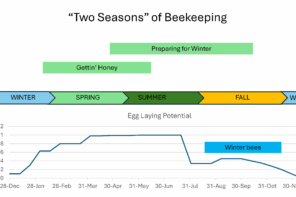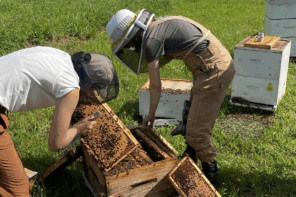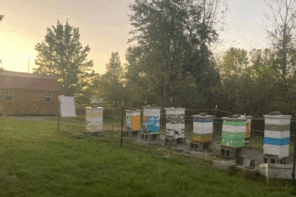Jeremy Barnes
I need to have some paving done here at home. My neighbor was having asphalt laid in his driveway so I walked over to see the work being done. The crew was surly and uncommunicative, to the point that I would not choose to have them on my property irrespective of the quality of their work. They did not realize that they were representing their company, nor did they understand the importance of communication.
In May and June of this year, Steve Repasky, President of the Pennsylvania State Beekeepers’ Association, wrote two lead pieces in the state newsletter exposing ‘the elephant in the room,’ namely how beekeepers interact with the non-beekeeping public, particularly in the swarm season. “Many raise the flag of ‘save the bees’ when it comes to rescuing swarms or relocating a colony in a hive” he wrote. “I’ve had numerous calls from members of the public who have reached out to beekeepers who don’t have the time nor do they want more bees, yet we have a responsibility as beekeepers to be good neighbors, especially to those many nervous non-beekeepers with a fear of stinging insects.”
The publicity surrounding CCD lead to a significant increase in the numbers of new beekeepers, the upside of which is the public awareness of the role and importance of honey bees, even as ignorance as to the role of wild bees and other pollinators continues.
The downside is that the attrition rate among new beekeepers is high. Let’s assume it is 25% per year, which is probably an under-estimate but includes those well intentioned romantics who want to save the bees by starting a hive. That means that out of a class of 20 new-bees, eight will still be active by the fourth year. So the question is, what damage might be caused by those 60 per cent who do not continue? And this is not just the environmental damage that can come from neglecting a colony and the associated spreading of pathogens. It includes the societal neglect that Steve describes, with all of its potential consequences for those who do persevere.
In an interview by Dr. Tracy Farone in the June issue of Bee Culture, Dr. Margarita López-Uribe is cited as saying that “… honey bees are domesticated animals that need food, care and treatment. This takes training, equipment and understanding,” and that establishing a honey bee colony without the necessary understanding may not be helping anyone, including the bees.
Her advice is to become an informed steward of the environment by becoming knowledgeable about good management of all pollinators as well as of the forage and habitat in the extended area (circa 10,000 acres) in which the colony will be situated. After all, we call ourselves beekeepers, not specifically honey bee keepers.
So the issue moves from one of quantity to one of quality. Most local associations are proud of their increased numbers – in York County, PA, for example, the paid membership has increased from 20 to over 240 in the space of 12 years – and welcome anyone who shows an interest in taking the Introduction to Beekeeping classes. But an open door policy is a welcome mat to neuroses. I cannot imagine a way in which we could somehow pre-select new beekeepers, as do professional vocations like medicine, law and engineering, but perhaps we can be more rigorous, both at the state and local levels, in spelling out the responsibilities and commitments involved. While not actively discouraging new-bees, we need to clarify what is involved and the consequences of non-compliance. Putting this up-front in the slide presentation for the first class is relatively ineffective in the face of the naive enthusiasm of the beekeeper-in-waiting; perhaps the year needs to start with a face-to-face meeting (more easy now we have Zoom) between a few experienced beekeepers and those who want to start a hive focusing on the realities and accountability of this wonderful hobby. For those who want to ‘save the bees’, for example, one can suggest that developing a pollinator-friendly environment is just as valid as starting a new hive. And the classes need to end with responsible ways to unload a colony if one decides to discontinue as a beekeeper, besides neglect and abandonment.
At the same time we can make every effort to contact those who dropped out early and find out the vital factors that made them do so, perhaps the first question being, “What information at the outset did you not have but, if you had, might have led to a different decision on your part?”
Then there is the role of the inspectors in those states fortunate to have them, stretched and under-funded as they are. Can they possibly report on neglected hives, even if only to the local beekeeping association, who can follow-up with an offer of assistance?
Clearly none of this reaches those beekeepers who are not associated with the state or local associations, nor those who have not registered their hive with the relevant authority, if required to do so. But if we are serious about the impact of the neglect that Steve describes, we need to start somewhere.
Like company laborers, we represent the beekeeping industry in what we say and do, not least because honey bees cannot speak for themselves. To start and then neglect a colony is a form of abuse and we have an obligation to do everything possible to prevent it. That is part of the stewardship that comes with responsible beekeeping.









